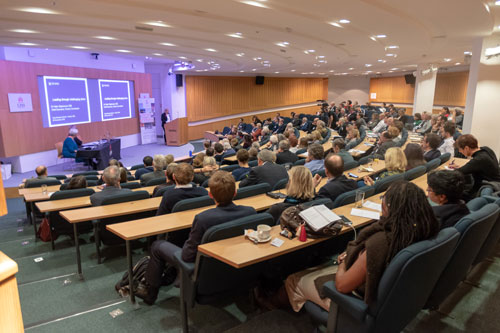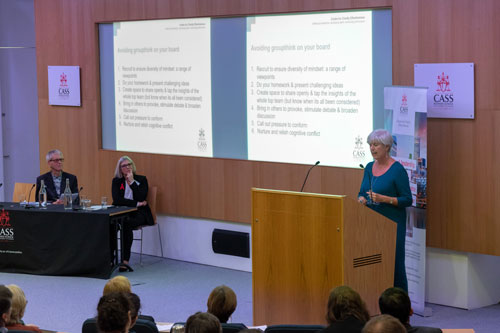Charity Commission CEO highlights ‘challenging times’ for sector during final Charity Talks event for 2018
Public trust in charities is at lowest point on Commission’s records
The Chief Executive of the Charity Commission for England and Wales, Dr Helen Stephenson CBE, outlined the challenges facing the charity sector at the November Charity Talks event at Sir John Cass Business School.
The Charity Talks series, has been run by Cass’s Centre for Charity Effectiveness (CCE) for 25 years and invites leading figures to discuss current key issues facing people in non-profit organisations
Dr Stephenson gave a talk titled Leading through challenging times. She was welcomed to the stage by the President of the Cass CCE, Professor Ian Bruce CBE, and accompanied by Cass CCE Consultant and Senior Visiting Fellow, Caroline Copeman.
Challenging times
During her opening address Dr Stephenson detailed the sheer scale of the charity sector and some of the challenges it faces.
In the 2017-18 period, there were more than 168,000 registered charities in England and Wales, generating an income of £76bn. The Commission received more than 8,300 applications to register as a charity while it also removed more than 4,300 registrants.
“2018 has undoubtedly been exceptionally challenging for many charities and their relationships with the public and this has had repercussions for the Commission,” Dr Stephenson said.
“The public simply no longer give charities the benefit of the doubt … there is no longer a trust premium being a registered charity.”
Commission exists to maximise public benefit
Recent research from the Commission shows that levels of public trust in charitable organisations in England and Wales are at their lowest point since monitoring began.
“These findings should be a cause for concern for all charities and for all those who care about the sector — they certainly concern us at the Commission,” Dr Stephenson said.
With this in mind, Dr Stephenson reassured the audience that charities remain an important aspect of society and said the Commission was leading the charge towards a better future by working with charitable organisations.
“Charity is not the icing on the cake; it is a crucial ingredient in the mix of functioning communities and a functioning society,” Dr Stephenson said.
“The purpose behind everything the Commission does is to ensure that charity can thrive and inspire trust, so that people can improve lives and strengthen society.
“Maximising the benefit of charity to the public is a collective responsibility and a collective prize that we the Commission share with charities.”
Academic perspectives on building trust
Caroline Copeman, Consultant and Senior Visiting Fellow at Cass’s Centre for Charity Effectiveness, has taught on the Charity Masters programme for the last 15 years.
Caroline echoed Dr Stephenson’s views about the importance of public trust in charities, outlining a number of ways that charitable organisations can strengthen this trust, starting with how they build trust in the boardroom..
“What differentiates the fabulous boards from the merely good is how they make decisions, and how this in turn builds and strengthens trust, so what I want to focus on [tonight] are three things that are component parts of decision-making.”
- Critical thinking
- Avoiding groupthink
- Building and rebuilding trust: where the pebble goes in the trust pond
On the topic of critical thinking, Caroline said trustees and board members of charitable organisations can teach themselves to be better at critical thinking by tapping into the cognitive side of the decision making process.
“We have a tendency, when we make decisions, to act first. What Andy Gibson calls ‘The Sprinter’ in our brain takes over and we automatically make decisions … actually, we need to pause and have ‘The Thinker’ take over. We can train ourselves to stop and reflect and learn from decisions we’ve made in the past, recognise unconscious biases, get clear on the facts and seek evidence.”
‘Call out pressure to conform’
Caroline said avoiding group think in the boardroom was one of the best measures charities could take to enhance performance and improve the quality of decision making.
“People feel that conformity and harmony make for better decisions than does challenge. Moderate levels of cohesion are great, but too much can be dangerous because we are attracted to people who think like us and we tend to give too much weight what they say.”
To avoid group think Caroline said organisations should strive for a diverse mindset among top team: both staff and trustees. Where that is not yet possible or is in process, trustees should always do their homework, think about challenging ideas and come up with individual perspectives and insights into issues facing the organisation.
“Call out pressure to conform, nurture and relish cognitive conflict … challenging ideas is really hard and sometimes we struggle with it but it will improve the quality of decision making and it will build trust.”
Finally, Caroline said trust, while it can be reinforced by structures and processes, is ultimately about behaviour, and is the product of positive human interactions.
“It is something that we have to work at. It isn’t something we can take for granted. Trust is both about someone’s track record and is based upon the receipt of genuine care and concern and we need both aspects in order to build trust in the boardroom.”
Caroline concluded the November Charity Talks event with a list of commitments that could be used to build trust, at both a personal and organisational level.
- Do the homework – build knowledge and insights, create social networks to harvest new ideas.
- Differentiate between cognitive and relational challenge: practise the former.
- Call out pressure to conform.
- Seek feedback on your trust building abilities.
Find out more about professional training courses at the Centre for Charity Effectiveness.
